
The Brooks–Baxter War, also known as the Brooks–Baxter Affair, was an attempt made by failed gubernatorial candidate Joseph Brooks of the “Brindle-tail” faction of Arkansas' Republican Party to take control of the state from Elisha Baxter, who was the Republican governor. The victor in the end was the Baxter administration, also known as the "Minstrels", supported by some "carpetbaggers" and Democrats over the Brindle-tails supported by "scalawags" and "freedmen".

From the first United States Congress in 1789 through the 116th Congress in 2020, 162 African Americans served in Congress. Meanwhile, the total number of all individuals who have served in Congress over that period is 12,348. Between 1789 and 2020, 152 have served in the House of Representatives, 9 have served in the Senate, and 1 has served in both chambers. Voting members have totaled 156, with 6 serving as delegates. Party membership has been 131 Democrats and 31 Republicans. While 13 members founded the Congressional Black Caucus in 1971 during the 92nd Congress, in the 116th Congress (2019-2020), 56 served, with 54 Democrats and 2 Republicans.
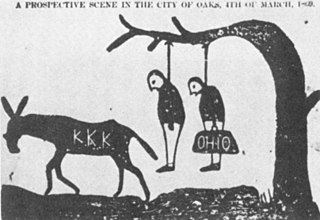
In United States history, the pejorative scalawag referred to white Southerners who supported Reconstruction policies and efforts after the conclusion of the American Civil War.
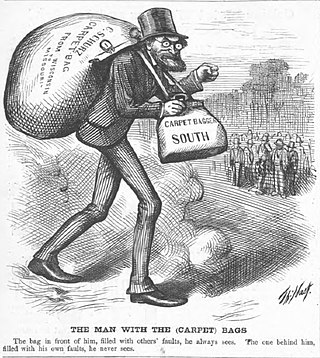
In the history of the United States, carpetbagger is a largely historical pejorative used by Southerners to describe allegedly opportunistic or disruptive Northerners who came to the Southern states after the American Civil War, and were perceived to be exploiting the local populace for their own financial, political, and/or social gain. The term broadly included both individuals who sought to promote Republican politics, and individuals who saw business and political opportunities because of the chaotic state of the local economies following the war. In practice, the term carpetbagger often was applied to any Northerners who were present in the South during the Reconstruction Era (1865–1877). The word is closely associated with scalawag, a similarly pejorative word used to describe native white Southerners who supported the Republican Party-led Reconstruction.
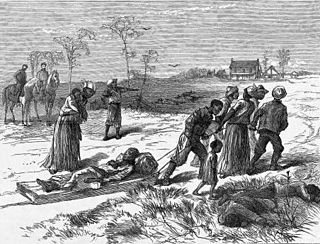
The Colfax massacre, sometimes referred to as the Colfax riot, occurred on Easter Sunday, April 13, 1873, in Colfax, Louisiana, the parish seat of Grant Parish. An estimated 62–153 Black militia men were murdered while surrendering to a mob of Southern Democrats and members of the Ku Klux Klan. Three white men also died during the confrontation.
The Redeemers were a political coalition in the Southern United States during the Reconstruction Era that followed the American Civil War. Redeemers were the Southern wing of the Democratic Party. They sought to regain their political power and enforce White supremacy. Their policy of Redemption was intended to oust the Radical Republicans, a coalition of freedmen, "carpetbaggers", and "scalawags". They were typically led by White yeomen and dominated Southern politics in most areas from the 1870s to 1910.
The Coushatta massacre (1874) was an attack by members of the White League, a white supremacist paramilitary organization composed of white Southern Democrats, on Republican officeholders and freedmen in Coushatta, the parish seat of Red River Parish, Louisiana. They assassinated six white Republicans and five to 20 freedmen who were witnesses.
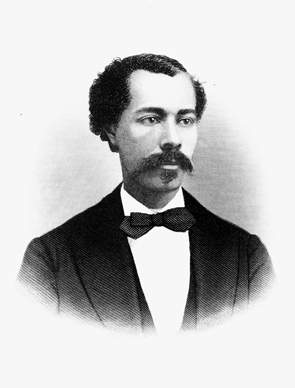
John Roy Lynch was an American writer, attorney, military officer, author, and Republican politician who served as Speaker of the Mississippi House of Representatives and represented Mississippi in the United States House of Representatives.

The history of the state of Mississippi extends back to thousands of years of indigenous peoples. Evidence of their cultures has been found largely through archeological excavations, as well as existing remains of earthwork mounds built thousands of years ago. Native American traditions were kept through oral histories; with Europeans recording the accounts of historic peoples they encountered. Since the late 20th century, there have been increased studies of the Native American tribes and reliance on their oral histories to document their cultures. Their accounts have been correlated with evidence of natural events.

The South Carolina Republican Party (SCGOP) is the state affiliate of the national Republican Party in South Carolina. It is one of two major political parties in the state, along with the South Carolina Democratic Party, and is the dominant party. Incumbent governor Henry McMaster, as well as senators Tim Scott and Lindsey Graham, are members of the Republican party. Graham has served since January 3, 2003, having been elected in 2002 and re-elected in 2008, 2014, and 2020; Tim Scott was appointed in 2013 by then-governor Nikki Haley, who is also a Republican.
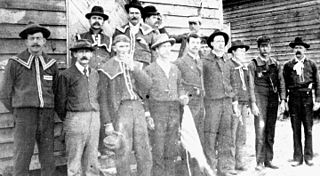
The Red Shirts or Redshirts of the Southern United States were white supremacist paramilitary terrorist groups that were active in the late 19th century in the last years of, and after the end of, the Reconstruction era of the United States. Red Shirt groups originated in Mississippi in 1875, when anti-Reconstruction private terror units adopted red shirts to make themselves more visible and threatening to Southern Republicans, both whites and freedmen. Similar groups in the Carolinas also adopted red shirts.
The South Carolina civil disturbances of 1876 were a series of race riots and civil unrest related to the Democratic Party's political campaign to take back control from Republicans of the state legislature and governor's office through their paramilitary Red Shirts division. Part of their plan was to disrupt Republican political activity and suppress black voting, particularly in counties where populations of whites and blacks were close to equal. Former Confederate general Martin W. Gary's "Plan of the Campaign of 1876" gives the details of planned actions to accomplish this.

Henry Clay Warmoth was an American attorney and veteran Civil War officer in the Union Army who was elected governor and state representative of Louisiana. A Republican, he was 26 years old when elected as 23rd Governor of Louisiana, one of the youngest governors elected in United States history. He served during the early Reconstruction Era, from 1868 to 1872.

Disfranchisement after the Reconstruction era in the United States, especially in the Southern United States, was based on a series of laws, new constitutions, and practices in the South that were deliberately used to prevent black citizens from registering to vote and voting. These measures were enacted by the former Confederate states at the turn of the 20th century. Efforts were also made in Maryland, Kentucky, and Oklahoma. Their actions were designed to thwart the objective of the Fifteenth Amendment to the United States Constitution, ratified in 1870, which prohibited states from depriving voters of their voting rights based on race. The laws were frequently written in ways to be ostensibly non-racial on paper, but were implemented in ways that selectively suppressed black voters apart from other voters.
The Election Massacre of 1874, or Coup of 1874, took place on election day, November 3, 1874, near Eufaula, Alabama in Barbour County. Freedmen comprised a majority of the population and had been electing Republican candidates to office. Members of an Alabama chapter of the White League, a paramilitary group supporting the Democratic Party's drive to regain political power in the county and state, used firearms to ambush black Republicans at the polls.

The Government of Mississippi is the government of the U.S. state of Mississippi. Power in Mississippi's government is distributed by the state's Constitution between the executive and legislative branches. The state's current governor is Tate Reeves. The Mississippi Legislature consists of the House of Representatives and Senate. Mississippi is one of only five states that elects its state officials in odd numbered years. Mississippi holds elections for these offices every four years in the years preceding Presidential election years.

The Meridian race riot of 1871 was a race riot in Meridian, Mississippi in March 1871. It followed the arrest of freedmen accused of inciting riot in a downtown fire, and blacks' organizing for self-defense. Although the local Ku Klux Klan (KKK) chapter had attacked freedmen since the end of the Civil War, generally without punishment, the first local arrest under the 1870 act to suppress the Klan was of a freedman. This angered the black community. During the trial of black leaders, the presiding judge was shot in the courtroom, and a gunfight erupted that killed several people. In the ensuing mob violence, whites killed as many as 30 blacks over the next few days. Democrats drove the Republican mayor from office, and no person was charged or tried in the freedmen's deaths.

Elections in Alabama are authorized under the Alabama State Constitution, which establishes elections for the state level officers, cabinet, and legislature, and the election of county-level officers, including members of school boards.
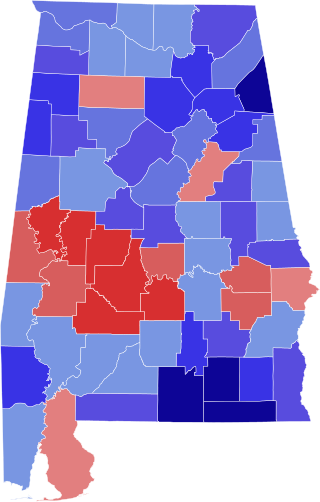
The 1874 Alabama gubernatorial election took place on November 3, 1874, in order to elect the governor of Alabama. Incumbent Republican David P. Lewis unsuccessfully ran for reelection, losing to Democratic former U.S. Representative George S. Houston. This election would end an era of serious competition between the local Democratic and Republican parties, and start a 112-year win streak for Democrats in the gubernatorial level.

The Vicksburg massacre, sometimes referred to as the Vicksburg riot, was a freedmen massacre on December 7, 1874, that continued until around January 5, 1875, in Vicksburg, Mississippi, U.S.. An estimated 150–300 Black citizens, and 2 White citizens were killed during the violence. Sheriff Peter Crosby, an African American, was forcibly removed from office, reinstated, and then shot in the head.